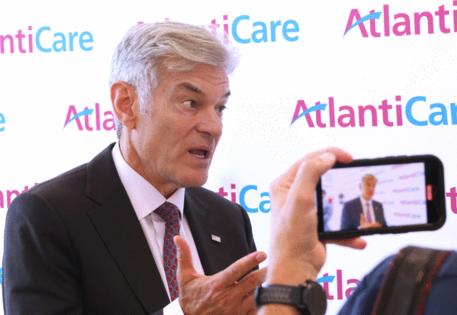Trump official Dr. Oz to health workers in Atlanta: 'I'm here recruiting'
Published in News & Features
ATLANTA — Dr. Mehmet Oz, who runs one of President Donald Trump’s most consequential health offices, came to Atlanta on Wednesday and told a conference ballroom full of health executives and workers that he sees a world full of promise under recent Trump health initiatives.
And he’s hiring.
“If you don’t come, you’re going to regret it for the rest of your life,” he said to the Health Connect South conference held at the Georgia Aquarium, referring to the jobs he has open.
Oz’s event stood as sunny contrast to recent Health and Human Services Department news on the Trump administration’s efforts to eliminate “fraud, waste and abuse” by firing thousands of HHS workers, purging research data and scaling back Medicaid and Affordable Care Act health insurance funding.
Oz was initially scheduled to be joined at the conference by his former HHS colleague, Dr. Susan Monarez, then director of the Centers for Disease Control and Prevention. But she was fired.
As Oz spoke with beluga whales crisscrossing an elegant tank stage right, Monarez was in Washington, D.C., testifying to a U.S. Senate committee.
Oz has a sales pitch to the best and the brightest innovators, he said.
Oz said the recent tax and spending cut did not cut spending but put money into the system. If it did cut, that was to stop states “gam(ing) the system.” And federal workers he’s met are “superstars” who sacrifice to serve the nation and hate wasting time.
The TV doctor turned policy wonk is selling President Trump’s One Big, Beautiful Bill Act, which makes more than $1 trillion in health care cuts over the next 10 years.
Oz is administrator of the Centers for Medicare and Medicaid Services. That agency oversees Medicaid and the Affordable Care Act health insurance exchanges, both of which are in for cuts.
The initiatives Oz is overseeing will have some of the biggest personal impact on Americans of the entire administration.
The Congressional Budget Office has estimated that 10 million Americans will lose health insurance under the One Big, Beautiful Bill Act passed by Congress this summer. In Georgia, that will be 150,000 or so people, according to the health research group KFF. The number could rise to 500,000 if Congress doesn’t extend Affordable Care Act subsidies that are set to expire this year.
Answering questions posed by former HHS Secretary Tom Price of Georgia, Oz especially defended the tax and spending bill’s treatment of rural health care.
It’s a sore subject, as some strained health facilities are already cutting back care or closing down, citing the spending bill’s health cuts as the last straw. In Georgia, a hospital in Lavonia recently announced it was shutting its labor and delivery unit, with the new law’s Medicaid cuts being the “solidifying” factor.
The health research organization KFF estimates the tax and spending law signed July 4 by Trump cuts $137 billion from rural Medicaid funding. A smaller amount of different funding, $50 billion, will go to rural innovation over the next five years.
Oz focused on that Rural Health Transformation Fund. The fund will direct $50 billion over five years to rural health care — whether that be tech companies, hospitals, clinics or other applicants.
“Our hope is not to pay the bills, because that’s not sustainable, because it’s not working,” Oz said. “It’s to transform the system.”
Oz mixed and matched figures, calling the fund a 50% increase in funding. The $50 billion fund is not just for hospitals, but for a range of health businesses. Analysts found that the overall cut to rural Medicaid health spending would be $137 billion. If the $50 billion were compared to that, it’s still a big cut.
Oz also lauded Georgia’s Pathways Medicaid program with work requirements as a smart path for other states to take, “a clever and thoughtful and customized approach.” Now two years underway, Pathways’ enrollment is just over 9,000, according to the Georgia Budget and Policy Institute, far short of the 100,000 or so that the state hoped would enroll.
©2025 The Atlanta Journal-Constitution. Visit at ajc.com. Distributed by Tribune Content Agency, LLC.







Comments